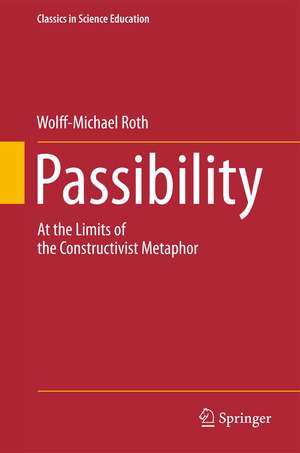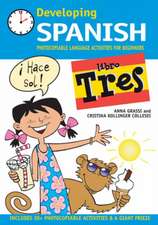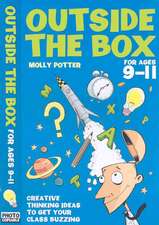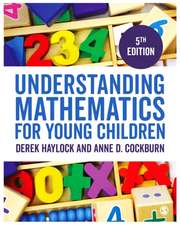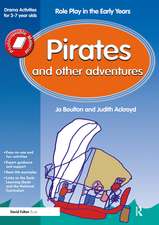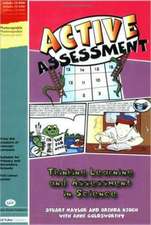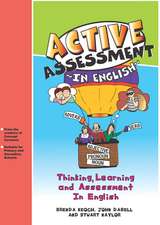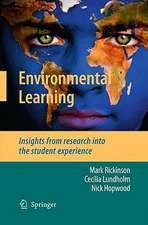Passibility: At the Limits of the Constructivist Metaphor: Classics in Science Education, cartea 3
Autor Wolff-Michael Rothen Limba Engleză Paperback – 27 noi 2013
In support of the hypothesis that passibility underlies cognition, readers are provided with a collation of empirical studies and phenomenological analyses of knowing and learning science—in schools, scientific laboratories and everyday life—all of which defy a constructivist explanation. The author argues that ‘passibility’ constitutes an essential factor in the development of consciousness, with a range of essential experiences that cannot be brought into the linguistic realm. His exploration is guided by concepts such as ‘otherness’, passion, passivity and undecidability, and concludes by resituating the construction metaphor to accord it its proper place in a more comprehensive theory of learning.
| Toate formatele și edițiile | Preț | Express |
|---|---|---|
| Paperback (1) | 734.14 lei 38-44 zile | |
| SPRINGER NETHERLANDS – 27 noi 2013 | 734.14 lei 38-44 zile | |
| Hardback (1) | 892.59 lei 6-8 săpt. | |
| SPRINGER NETHERLANDS – 5 aug 2011 | 892.59 lei 6-8 săpt. |
Preț: 734.14 lei
Preț vechi: 965.98 lei
-24% Nou
Puncte Express: 1101
Preț estimativ în valută:
140.49€ • 152.56$ • 118.02£
140.49€ • 152.56$ • 118.02£
Carte tipărită la comandă
Livrare economică 19-25 aprilie
Preluare comenzi: 021 569.72.76
Specificații
ISBN-13: 9789400737464
ISBN-10: 9400737467
Pagini: 296
Ilustrații: XIV, 282 p.
Dimensiuni: 155 x 235 x 16 mm
Greutate: 0.42 kg
Ediția:2011
Editura: SPRINGER NETHERLANDS
Colecția Springer
Seria Classics in Science Education
Locul publicării:Dordrecht, Netherlands
ISBN-10: 9400737467
Pagini: 296
Ilustrații: XIV, 282 p.
Dimensiuni: 155 x 235 x 16 mm
Greutate: 0.42 kg
Ediția:2011
Editura: SPRINGER NETHERLANDS
Colecția Springer
Seria Classics in Science Education
Locul publicării:Dordrecht, Netherlands
Public țintă
ResearchCuprins
Frontispiece.- Preface.- 1. De/Constructing the Blind Spots of Constructivism.- PART A: PASSIVITY, UNCERTAINTY, UNDECIDABILITY.- 2. Learning and the Erasure of Knowledge.- 3. Radical Passivity in Learning.- 4. Radical Uncertainty in Acting.- 5. Emergence of Duality.- PART B: OTHERNESS.- 6. Talking Conceptions without Conceptions.- 7. Thought Follows Communication.- 8. Otherness of Self.- 9. The Nonsense of Meaning.- PART C: PASSIONS.- 10. Emotion, Motives, Motivations.- 11. Crises, Suffering, Joy.- 12. From Incarnation to Responsibility.- PART D: EPILOGUE.- 13. Sublating the Constructivist Metaphor.- References.- Index.
Textul de pe ultima copertă
This book argues that the ‘constructivist metaphor’ has become a self-appointed overriding concept that suppresses other modes of thinking about knowing and learning science. Yet there are questions about knowledge that constructivism cannot properly answer, such as how a cognitive structure can intentionally develop a formation that is more complex than itself; how a learner can aim at a learning objective that is, by definition, itself unknown; how we learn through pain, suffering, love or passion; and the role emotion and crises play in knowing and learning.
In support of the hypothesis that passibility underlies cognition, readers are provided with a collation of empirical studies and phenomenological analyses of knowing and learning science—in schools, scientific laboratories and everyday life—all of which defy a constructivist explanation. The author argues that ‘passibility’ constitutes an essential factor in the development of consciousness, with a range of essential experiences that cannot be brought into the linguistic realm. His exploration is guided by concepts such as ‘otherness’, passion, passivity and undecidability, and concludes by resituating the construction metaphor to accord it its proper place in a more comprehensive theory of learning.
In support of the hypothesis that passibility underlies cognition, readers are provided with a collation of empirical studies and phenomenological analyses of knowing and learning science—in schools, scientific laboratories and everyday life—all of which defy a constructivist explanation. The author argues that ‘passibility’ constitutes an essential factor in the development of consciousness, with a range of essential experiences that cannot be brought into the linguistic realm. His exploration is guided by concepts such as ‘otherness’, passion, passivity and undecidability, and concludes by resituating the construction metaphor to accord it its proper place in a more comprehensive theory of learning.
Caracteristici
Radically new, empirically based epistemology in science/technology-related knowing and learning Integrative treatment of emotion, motivation, and the passions in a comprehensive theory First/third person perspectives on critical aspects of learning in science
